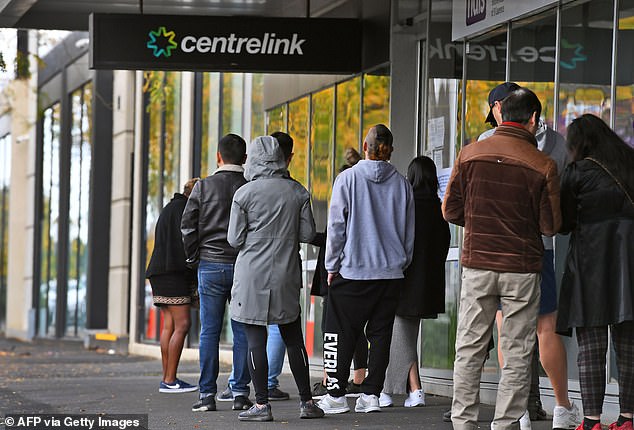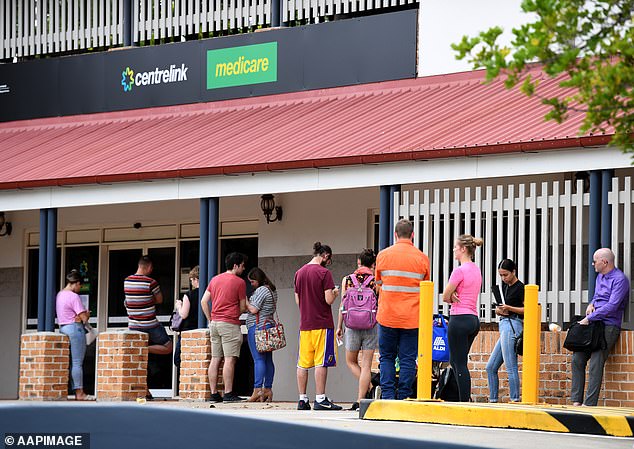The number of unanswered calls to Centrelink almost doubled in the year to 31 March 2024, to more than 11 million.
The shocking figure was revealed in data from Services Australia, while Centrelink also issued an urgent warning about payments made to a large number of Australians.
New figures revealed there were a massive 11,268,048 congestion messages, compared to 6,997,300 in the previous 12-month period, on Centrelink social security and welfare lines.
Congestion messages are automated recordings that tell people waiting in a telephone queue that staff are too busy to respond to them.
Those trying to reach a person are referred to online services and then the call is abruptly disconnected.
Nearly two million of those interrupted calls were to disability, illness and carer lines, and those who did get through still had to wait an average of 47 minutes.
And those huge figures don’t even include unanswered calls from Medicare and Centrelink aged care customers, who were hung up on more than a million times.
That figure represented a worrying increase of 27,500 percent compared to the previous year, when only 4,067 people were treated.
The number of unanswered calls to Centrelink almost doubled in the year to 31 March 2024, to more than 11 million (file image)
Disgruntled Centrelink customers have expressed their frustration at the situation on social media.
“It’s so funny that Centrelink keeps sending emails to tell us we have to call them. Even funnier that I’ve tried calling them every day for the last week and they just hang up,” one person wrote sarcastically.
Another said: “It’s like Centrelink isn’t responsible over the phone, but I’ll lose my payments if I don’t speak to someone. I can’t just take a week off (work) just to try and hopefully get through.”
A third person, who had an issue “that cannot be fixed on the Centrelink app or website”, was also furious at being hung up on.
“Is your solution to call that number? What do I do? Keep calling and get hung up on until I go crazy?” they tweeted.
“There are no queues and no call back service. I am given the responsibility of fixing a Centrelink error and then required to spend hours of my time fixing it.”
Thousands more staff have been recruited to work with Centrelink and had already been trained to handle calls and process claims by April, Services Australia said.
CEO Hank Jongen said that “the use of congestion messages has been halved since January” and that waiting times have decreased.
“Overall, Centrelink call waiting times have decreased from an average of 31 minutes in January to approximately 25 minutes in June, depending on the day,” he said. 7News.
However, new employees and their colleagues have a huge backlog of claims to process and the situation remains very difficult for vulnerable people.
“In some cases, people are calling because their payments have been reduced or cut off, leaving them unable to pay rent or buy food,” said Australian Council of Social Service (ACoSS) acting chief executive Edwina MacDonald.
‘Long wait times for calls are a big problem because it means people who need support can’t get the help they need.
“It is very worrying that there are more than 11 million congestion messages, which block the caller and tell them to try again at another time because the lines are too busy.”
Ms MacDonald said ACoSS welcomed the $1.8 billion investment to hire 3,000 new staff, but “many are still waiting too long”.
‘The Government must continue to invest in Services Australia, including by employing and retaining skilled staff, after many years of cuts to this essential service.’
Meanwhile, people receiving Centrelink benefits who travel abroad have been warned to inform the government of their plans.
“There are rules covering how travelling outside Australia may affect your payment or concession card,” the agency said, depending on “which payment or concession card you get.”
Social assistance recipients are reminded that if they leave Australia, their payments may be adjusted or even stopped altogether.
Centrelink customers are advised to check their account regularly via the myGov website and to inform the agency of their travel plans.
“If you are unable to report it online, you can report it by calling us on the phone number associated with your affected payment,” Centrelink said.
Before leaving Australia, beneficiaries must report their income on the last business day before they leave overseas, even if the reporting day falls on or after their departure.
They must also inform the government if they travel abroad to see their partner while receiving singles benefits.
“If you travel abroad to visit your partner… we need to review your payment before you leave, otherwise we may pay you too much,” the agency said.
If Centrelink attempts to contact a recipient while they are overseas but is unable to, their payment card or concession may be suspended and cannot be reinstated until the customer returns to Australia.

Centrelink’s social security and welfare lines received 11,268,048 congestion messages, compared to 6,997,300 in the previous 12-month period. Pictured is a queue at a Centrelink office

People receiving Centrelink benefits who are travelling abroad have been warned to inform the government of their plans. Pictured is a queue at a Centrelink office
If you are travelling outside Australia for less than a year, eligible payments will continue every two weeks as usual, provided Centrelink is aware of the person’s plans.
If you are out of the country for more than a year, payments will be made every four weeks.
These monthly payments can be made to an overseas bank account in local currency or US dollars, depending on where the person is traveling.
If a serious problem, such as illness or a natural disaster, affects a person’s ability to return home to Australia, payments may be extended but the customer will need to contact Centrelink International Services.

